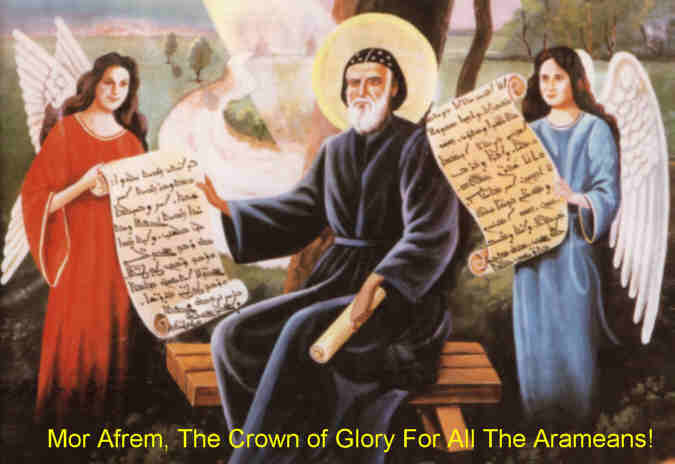
Now here is a theologian with an original way of doing things. Known as Ephraem the Syrian, or Ephrem of Edessa, this early church theologian wrote most of his theology in verse. Although he died in 373 A.D., it is thought that Ephrem's writings about death and the Last Judgment inspired the Italian poet Dante Alighieri (1265-1321) to write the Divina Commedia.
Ephrem was born in what is now modern-day Turkey in approximately 306. When his city of Nisibis was conquered by the Persians in 363, Ephrem fled to a remote cave in Edessa (modern-day Iraq). He spent the remainder of his life in seclusion as a monk, but he put his seclusion to good use. He became known as the "Lyre of the Holy Ghost" and the "Prophet of the Syrians" because he demonstrated that poetry and hymns could be used as a means to deliver theology to the world.
The following hymn by Ephrem of Edessa is Hymn No. 443 in The Hymnal 1982. It was translated from Greek to English by J. Howard Rhys (b. 1917) who formerly taught Greek and New Testament at The University of the South School of Theology.
Ephrem was born in what is now modern-day Turkey in approximately 306. When his city of Nisibis was conquered by the Persians in 363, Ephrem fled to a remote cave in Edessa (modern-day Iraq). He spent the remainder of his life in seclusion as a monk, but he put his seclusion to good use. He became known as the "Lyre of the Holy Ghost" and the "Prophet of the Syrians" because he demonstrated that poetry and hymns could be used as a means to deliver theology to the world.
The following hymn by Ephrem of Edessa is Hymn No. 443 in The Hymnal 1982. It was translated from Greek to English by J. Howard Rhys (b. 1917) who formerly taught Greek and New Testament at The University of the South School of Theology.
From God Christ's deity came forth,
his manhood from humanity;
his priesthood from Melchizedek,
his royalty from David's tree:
praised be his One-ness.
He joined with guests at wedding feast,
yet in the wilderness did fast;
he taught within the temple's gates;
his people saw him die at last:
praised be his teaching.
The dissolute he did not scorn,
nor turn from those who were in sin;
he for the righteous did rejoice
but bade the fallen to come in:
praised be his mercy.
He did not disregard the sick;
to simple ones his word was given;
and he descended to the earth
and his work done, went up to heaven:
praised be his coming.
Who then, my Lord, compares to you?
The Watcher slept, the Great was small,
the Pure baptized, the Life who died,
the King abased to honor all:
praised be your glory.
So, do you love Ephrem now? He's a man after my own heart.
In peace,
Linda+
The Rev. Linda McCloud
Founding Pastor
The Episcopal Church of Our Savior at Honey Creek
www.oursaviorhoneycreek.org
http://oursaviorhoneycreek.blogspot.com




1 comment:
Beautiful post!
Post a Comment